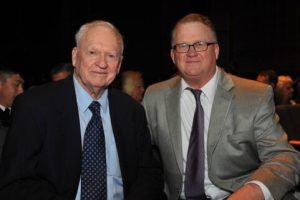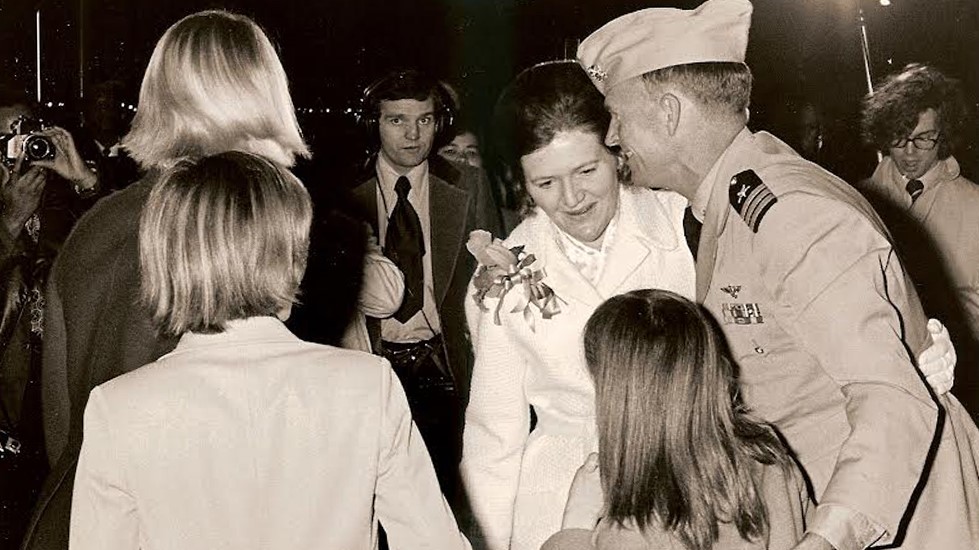Above: Eugene “Red” McDaniel hugs his wife, Dorothy, upon his arrival to the United States after release from a Vietnamese prisoner of war camp in 1973. His children Mike, David, and Leslie look on. “He was larger than life, but he was small. He had lost a lot of weight and was somewhat frail but okay,” son Mike recalls. (Photo courtesy of Mike McDaniel)
VIRGINIA BEACH, Va. (BP) —If you were alive on March 7, 1970, and living on the East Coast of the United States, you likely remember the day. Called the “Eclipse of the Century,” everything went dark in major cities throughout the coast—including Savannah, Georgia; New York City; and Virginia Beach, Va.
But Mike McDaniel has a different memory of the day.
For him, it’s the day the light came back on.
On May 19, 1967, nearly three years earlier, the plane of Eugene “Red” McDaniel, Mike’s father, had been shot down over Vietnam. For 1,024 days, Mike, his mom, and two siblings waited for news. Not knowing yet if he was dead or alive in a North Vietnamese prison, they hoped and prayed for good news.

Eugene “Red” McDaniel, left, poses for a photo with his son, Mike. Although he says his father never pressured him to do so, Mike eventually followed in his father’s footsteps as a Navy captain. (Photo courtesy of Mike McDaniel)
On March 7, 1970, the day their neighbors stared into a darkened sky in the middle of the day, the McDaniel family received a short, 50-word note from Red—saying that he was okay and urging his family toward hope.
“It was like rejuvenation, because we knew he was alive,” Mike said. “That was what we’d been holding on to for three years. Three years we never knew. Now we know that he’s being held captive. We know he’s alive. That is being acknowledged. So, we were ready to say, ‘Let’s get this war over so he can come home.’”
The McDaniels would need to wait another three years before the North Vietnamese released Red among 591 total prisoners of war (POW) in February and March 1973, following the Paris Peace Accords ending U.S. involvement in the war. Named “Operation Homecoming,” the arrival of U.S. POWs 50 years ago was a rare moment of celebration for Americans at the end of one of the nation’s most controversial wars.
Like the other prisoners of war in Vietnam, Red experienced brutal conditions, torture and solitary confinement at the hands of his North Vietnamese captors. He documented those six years of abuse in a gripping 1975 memoir, entitled Scars and Stripes.
Red, a committed Christian and faithful Southern Baptist both before and after his time in Vietnam, served as an unofficial chaplain for many of the POWs. In his book, he describes the story of struggling to prepare a worship service and sermon for the POWs after learning that their scheduled release from the prison camp had fallen through. He chose the Book of Job to encourage the POWs to hold out, refusing to bend or become bitter, until they were eventually freed. Right before he was scheduled to deliver the sermon, news came that they would be released that very day.
Yet, it wasn’t just the POWs who suffered during their captivity. Their families faced years without their loved ones, not knowing whether they were alive. They missed weddings, graduations and baseball games.
Mike, the oldest of the three McDaniel children, was 8 years old when his dad left and 15 when he returned. Athletics were central to his life during those years, so Mike felt the loss of his dad particularly hard during baseball, basketball and football games. Without a dad around, he added, he didn’t attend Cub Scouts. Father and son banquets were also off the table.
“You’d be at the games, and you’d realize a lot of other fathers were there, but your dad wasn’t,” Mike said more than 50 years later.
In those first few years, McDaniel’s family waited for any news about Red’s condition. Anti-war activists were regularly sending propaganda images and videos from the camps back to the United States. Mike remembers as a 9-year-old painstakingly reviewing them with his mother for any sign of his father.
“My dad was a six-foot-three, scrappy guy, so he stood out,” McDaniel said. “But we never really saw him. There were a couple of pictures where we thought we might have spotted him, but we couldn’t be sure. To me, that was like a nightmare. You’re sitting there with a new batch of photos, hoping, and praying that he’s going to show up somewhere.”
McDaniel’s mom, Dorothy, became one of the leading figures of the families of POWs who organized to advocate for their family members during the time they were away. Dorothy describes her experience as the wife of a POW and the family’s efforts to advocate on behalf of POWs still in Vietnam after Red’s 1973 release in her book, After the Welcome Home. Her father was a well-known North Carolina Baptist pastor and the first full-time Professor of Religion at Campbell University.
Mike vividly remembers watching on television the landing of his dad’s plane in the Philippines in March 1973. As the men disembarked the plane, the family waited anxiously to see Red. It wasn’t his face they saw first. It was his belt buckle, which was aligned with his pants and shirt.
“My mom just devolved into tears on the floor,” Mike said. “She hadn’t seen his face yet. But you knew it was him, and she just sobbed. She had to watch the rerun to see his actual face, but it was so cool. You see this guy come down. He was larger than life, but he was small. He had lost a lot of weight and was somewhat frail but okay.”
In the first few days after his release, the military learned much about the vicious torture Red endured. They warned the family that he may struggle to reacquaint himself with family life.
But McDaniel says today, the family never saw any signs that Red had those kinds of struggles.
Eventually, Mike followed in his father’s footsteps, joining the Navy and becoming a captain.
Doug Carver, the executive director of chaplaincy at the North American Mission Board, said Independence Day, Memorial Day and Veterans Day are great opportunities for Southern Baptists to listen to the stories of veterans and their families.
“Few Americans truly understand the complex, and often painful, sacrificial service required by our troops to support and defend the Nation,” Carver said. “Military veterans are waiting to share their personal stories when they meet people who sincerely desire to listen to their ‘sacred story.’ The local church is the perfect platform and a safe place for our veterans to share their military experiences. Southern Baptists must let our veterans, and their families, know that we are ready to listen, pray, and walk with them on the road to recovery from their war wounds and memories.”





